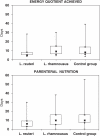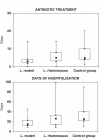Role of probiotics in the prevention of the enteric colonization by Candida in preterm newborns: incidence of late-onset sepsis and neurological outcome
- PMID: 20410904
- PMCID: PMC3016918
- DOI: 10.1038/jp.2010.57
Role of probiotics in the prevention of the enteric colonization by Candida in preterm newborns: incidence of late-onset sepsis and neurological outcome
Abstract
Objective: To evaluate the efficacy of probiotics in the prevention of gastrointestinal colonization by Candida species, of late-onset sepsis and neurological outcome in preterm newborns.
Study design: A prospective study was conducted in 249 preterms who were subdivided into three groups: one group (n=83) was supplemented with Lactobacillus (L.) reuteri, one group with L. rhamnosus (n=83) and the other with no supplementation (n=83). The fungal colonization in the gastrointestinal tract, the late onset of sepsis and clinical parameters were recorded. A neurological structured assessment was further performed at 1 year of age.
Result: Candida stool colonization was significantly higher (P<0.01) in the control group than in the groups treated with probiotics. The L. reuteri group presented a significantly higher reduction in gastrointestinal symptoms than did the L. rhamnosus and control groups. Infants treated with probiotics showed a statistically significant lower incidence of abnormal neurological outcome than did the control group.
Conclusion: The use of both probiotics seems to be effective in the prevention of gastrointestinal colonization by Candida, in the protection from late-onset sepis and in reducing abnormal neurological outcomes in preterms.
Figures


Similar articles
-
Oral supplementation with Lactobacillus casei subspecies rhamnosus prevents enteric colonization by Candida species in preterm neonates: a randomized study.Clin Infect Dis. 2006 Jun 15;42(12):1735-42. doi: 10.1086/504324. Epub 2006 May 4. Clin Infect Dis. 2006. PMID: 16705580 Clinical Trial.
-
Comparison of Lactobacillus reuteri and nystatin prophylaxis on Candida colonization and infection in very low birth weight infants.J Matern Fetal Neonatal Med. 2015;28(15):1790-4. doi: 10.3109/14767058.2014.968842. Epub 2014 Oct 9. J Matern Fetal Neonatal Med. 2015. PMID: 25245226 Clinical Trial.
-
Use of Lactobacillus casei subspecies Rhamnosus GG and gastrointestinal colonization by Candida species in preterm neonates.J Pediatr Gastroenterol Nutr. 2007 Dec;45 Suppl 3:S190-4. doi: 10.1097/01.mpg.0000302971.06115.15. J Pediatr Gastroenterol Nutr. 2007. PMID: 18185091 Review.
-
Enteral lactoferrin supplementation for prevention of sepsis and necrotizing enterocolitis in preterm infants.Cochrane Database Syst Rev. 2017 Jun 28;6(6):CD007137. doi: 10.1002/14651858.CD007137.pub5. Cochrane Database Syst Rev. 2017. Update in: Cochrane Database Syst Rev. 2020 Mar 31;3:CD007137. doi: 10.1002/14651858.CD007137.pub6 PMID: 28658720 Free PMC article. Updated. Review.
-
Probiotics to prevent necrotising enterocolitis and nosocomial infection in very low birth weight preterm infants.Br J Nutr. 2017 Apr;117(7):994-1000. doi: 10.1017/S0007114517000769. Epub 2017 Apr 26. Br J Nutr. 2017. PMID: 28443531
Cited by
-
Probiotics and necrotizing enterocolitis: finding the missing pieces of the probiotic puzzle.J Pediatr Pharmacol Ther. 2012 Oct;17(4):308-28. doi: 10.5863/1551-6776-17.4.308. J Pediatr Pharmacol Ther. 2012. PMID: 23412969 Free PMC article.
-
Intra-amniotic Candida albicans infection induces mucosal injury and inflammation in the ovine fetal intestine.Sci Rep. 2016 Jul 14;6:29806. doi: 10.1038/srep29806. Sci Rep. 2016. PMID: 27411776 Free PMC article.
-
Probiotics to prevent necrotising enterocolitis in very preterm or very low birth weight infants.Cochrane Database Syst Rev. 2023 Jul 26;7(7):CD005496. doi: 10.1002/14651858.CD005496.pub6. Cochrane Database Syst Rev. 2023. PMID: 37493095 Free PMC article. Review.
-
Interplay Between Peripheral and Central Inflammation in Autism Spectrum Disorders: Possible Nutritional and Therapeutic Strategies.Front Physiol. 2018 Mar 7;9:184. doi: 10.3389/fphys.2018.00184. eCollection 2018. Front Physiol. 2018. PMID: 29563885 Free PMC article. Review.
-
Probiotic Use and Safety in the Neonatal Intensive Care Unit: A Matched Cohort Study.J Pediatr. 2020 Jul;222:59-64.e1. doi: 10.1016/j.jpeds.2020.03.051. Epub 2020 May 14. J Pediatr. 2020. PMID: 32418818 Free PMC article.
References
-
- Makhoul IR, Kassis I, Smolkin T, Tamir A, Sujov P. Review of 49 neonates with acquired fungal sepsis. Pediatrics. 2001;107:61–66. - PubMed
-
- Makhoul IR, Sujov P, Smolkin T, Lusky A, Reichman B, In Collaboration with the Israel Neonatal Network Epidemiological, clinical and microbiological characteristics of late-onset sepsis among very low birth weight infants in Israel: a national survey. Pediatrics. 2002;109:34–39. - PubMed
-
- Makhoul IR, Bental Y, Weisbrod M, Sujov P, Lusky A, Reichman B. Candida versus bacterial late-onset sepsis in very low birth weight infants in Israel: a national survey. J Hosp Infect. 2007;65:237–243. - PubMed
-
- Gaynes RP, Edwards JR, Jarvis WR, Culver DH, Tolson JS, Martone WJ. Nosocomial infections among neonates in high-risk nurseries in the United States. Pediatrics. 1996;98:357–361. - PubMed
-
- Rabalais GP, Samiec TD, Bryant KK, Lewis JJ. Invasive candidiasis in infant weighing more than 2500 grams at birth admitted to a neonatal intensive care unit. Pediatric Infect Dis J. 1996;15:348–352. - PubMed
Publication types
MeSH terms
LinkOut - more resources
Full Text Sources
Other Literature Sources
Medical

